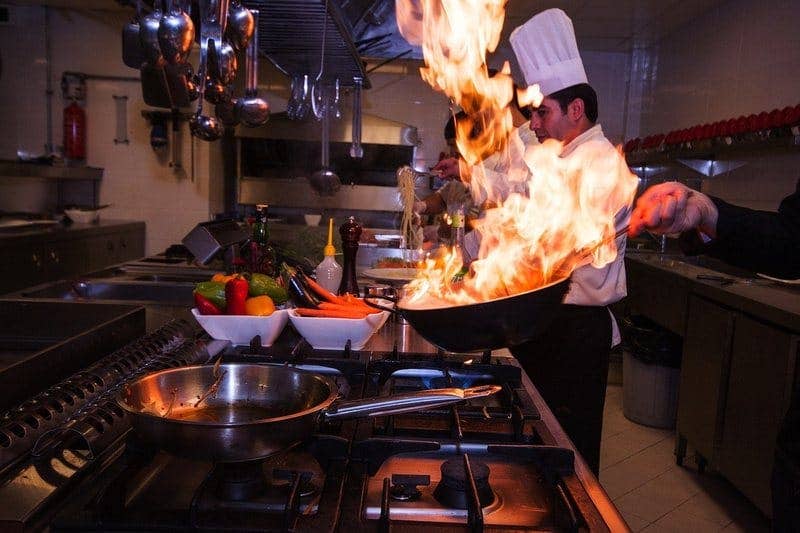As you’re shopping for a range hood, you might come across some hoods with fire suppression systems.
So you might wonder: do all range hoods have fire suppression systems?
Not all range hoods have fire suppression systems. Commercial range hoods are required to have fire suppression systems. The most common type of fire suppression system for range hoods is a sprinkler system. Fire suppression systems are not required for residential range hoods. Most residential hoods don’t have them.
What is a range hood fire suppression system?

A fire suppression system for your range hood is a safety measure to extinguish grease fires. It involves a tank that stores the extinguishing agent and sprinklers above the hood system. The most popular fire suppression system for range hoods is a wet chemical system. Other types of systems include water-based and pressurized gas systems.
Outside of range hoods, water-based fire suppression systems are the most common. Think of the sprinklers on the ceilings of schools or office buildings. These are water-based fire suppression systems.
Range hood fire suppression systems work the exact same way, except most use chemicals instead of water.
The quickest way to put out a fire is to deprive it of oxygen, fuel, or heat. Water suppresses heat just fine. But it’s partially oxygen, so it does not deprive the fire of oxygen as effectively as a chemical agent. Chemicals starve the fire, putting it out in seconds.
When excessive heat comes into contact with the sprinkler, it triggers automatically. Most fire suppression systems engage around 150 degrees Fahrenheit. They do not trigger from smoke, like a smoke alarm. But, keep in mind that grease fires can produce heavy smoke.
Fire suppression systems for range hoods are required by law in commercial environments, primarily restaurants. If a fire breaks out, the range hood can hopefully do all of the work for you. There will be no need to manually extinguish the fire.
Fire suppression systems will also turn off the gas to all appliances, so you don’t have to worry about rushing to do so yourself. It will also cut the power to outlets below the hood so there’s no fire hazard when the water or chemicals are released.
Any delay from the time the fire starts to the time it’s extinguished can be fatal. So fire suppression systems are key to ensuring the safety of all occupants.
Grease fires in your house are often small, and it only takes a few steps to put those out. But, when you’re cooking in a commercial kitchen, there’s a lot more heat and smoke. The stoves are being operated for eight to 10 hours at a time or longer.
Business owners don’t want any potential legal trouble resulting from employees getting hurt on the job, either. So, fire suppression systems are required to ensure everyone’s safety.
What type of fire suppression system is best suited for a commercial kitchen?
The best-suited fire suppression system for a commercial kitchen (and the most popular) is a wet chemical system. Some systems use liquid potassium carbonate to extinguish fires. Wet chemical systems include a tank to store the chemicals and a sprinkler system above the vent hood.
Each fire suppression system is designed specifically for your commercial kitchen setup. Fire suppression systems require a licensed fire safety professional to install and test the system before use.
Do I need a fire suppression system in my kitchen?
Homeowners do not need a fire suppression system in their kitchens. If you own a restaurant, your restaurant kitchen will require a fire suppression system. Other commercial cooking environments will require fire suppression systems, but restaurants are by far the most common.

Related Articles
Do range hoods prevent grease fires?













